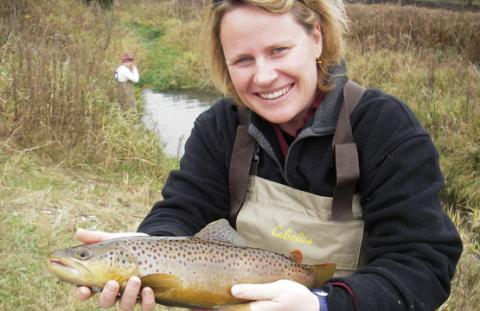

Wisconsin Sea Grant and Wisconsin Water Resources Institute
I have always had a passion for applied research, had a special place in my heart for aquatic resources in my Midwestern homeland, and wanted a career that could balance work with family.
Education
- B.S., Biology, University of Michigan, Secondary Teaching certification in Biology and Chemistry
- Ph.D., Biology/Aquatic Ecology, Boston University Marine Program, Marine Biological Laboratory, Woods Hole, Mass.
What is your current job and what does it entail?
As assistant director for research and student engagement for Wisconsin Sea Grant and the Wisconsin Water Resources Institute in Madison, I set priorities for water-related research for both surface waters (inland lakes, streams, rivers, and the Great Lakes) and groundwater in Wisconsin, coordinate the grant application process, and select the very best projects for funding. Each year, Wisconsin Sea Grant and the Water Resources Institute invest significant funding toward research, education and outreach that will be beneficial for society, with a focus on projects that will benefit public health and safety and will result in positive economic, recreational, and environmental outcomes. I am also developing a student program that is designed to bring together and support students funded from our programs as they conduct their projects and develop career skills.
What was the key factor in your career decision?
I have always had a passion for applied research, had a special place in my heart for aquatic resources in my Midwestern homeland, and wanted a career that could balance work with family.
What do like most about your career?
When the work we do makes a difference in protecting Wisconsin's aquatic resources for today's and future generations. I also work with incredibly talented and hard-working faculty, scientists, resource managers, educators and outreach specialists, and my colleagues inspire me every day.
What do you like least about your career?
A major challenge is when science becomes "politicized." This can happen on any issue and poses difficulties in bridging the gap between scientific results and communicating with the public.
What do you do to relax?
Enjoy time with family and friends. I also enjoy fishing, hunting, reading, archery, biking, walking, running, swimming and cooking.
Who are your heroes/heroines?
My teachers over the years who challenged me.
What advice would you give a student who expressed an interest in pursuing a career in your field?
Work hard in school, go to college, look for opportunities to volunteer in a lab with a professor or do an internship while in college to get experience in research. One-on-one experience with researchers is important for getting on a research career path and accepted into a graduate program with an advisor whose interests align with yours. Look for opportunities to present and publish your research.
Are career opportunities in your field increasing or decreasing and why?
I believe they are decreasing. In my experience as both an applicant and a recruiter, competition for any position in the resource management field is fierce, from summer positions to full-time agency science positions and college and university faculty positions.
What will you be doing 10 years from today?
I hope to be in a position where I can be involved in research and translating findings to inform on-the-ground decisions that will be beneficial to society. But, I am always open to new opportunities to learn and grow and contribute to the world.
